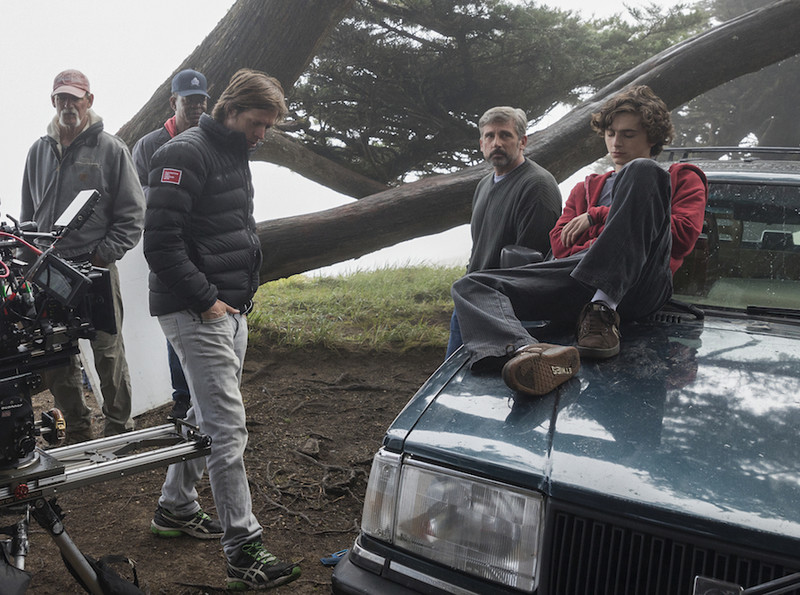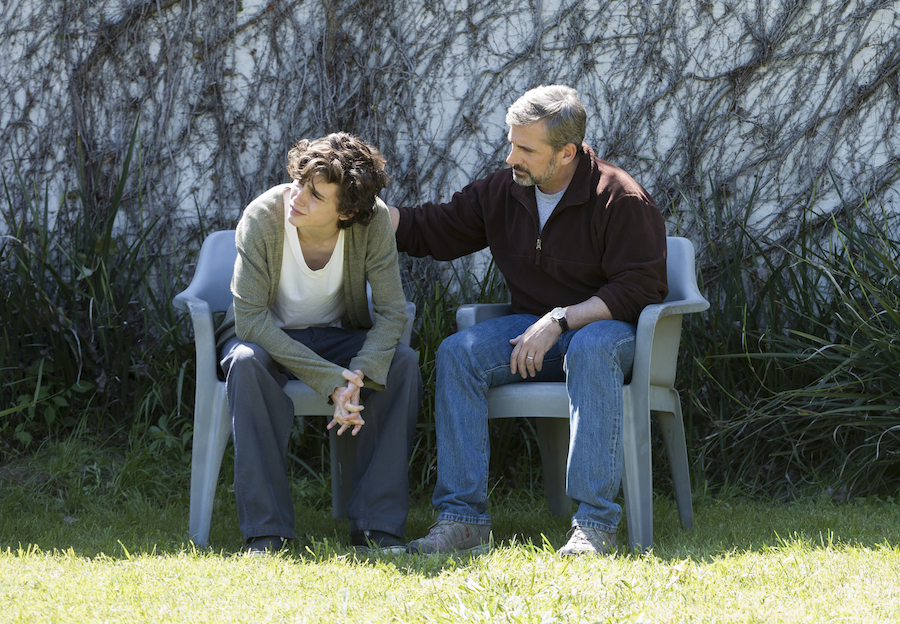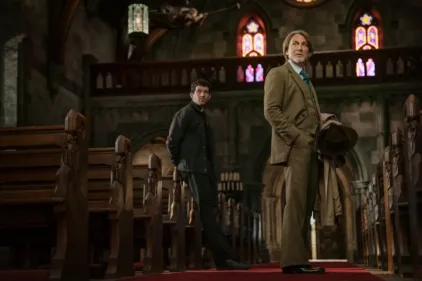Belgian auteur Felix Van Groeningen’s sixth feature and first English-language effort, “Beautiful Boy,” is unlike any film I’ve seen about the cyclical hell of drug addiction. Its nonlinear structure deliberately obscures the arc of its characters’ relationships, moving with the ebbs and flows of a life entrapped by compulsion. The disorientation brought about by this approach may be frustrating at times, but it is entirely by design, and what holds the picture together is its exceptionally empathetic ensemble. Steve Carell delivers his best dramatic work to date as David Sheff, a journalist struggling to care for his college-age son, Nic (Timothée Chalamet), who has become addicted to crystal meth. Fresh off his well-deserved Oscar nomination for “Call Me By Your Name,” Chalamet is every bit as riveting in an exceedingly different role, portraying the raw demons of his disease without sapping them of their humanity.
Just prior to his movie opening the 54th Chicago International Film Festival, Van Groeningen spoke with RogerEbert.com about his bold use of music, the difficulty in simultaneously adapting two memoirs and the contradictions that characterize an addict’s life.
How did you and your screenwriting partner Luke Davies go about weaving two memoirs—David Sheff’s “Beautiful Boy” and Nic Sheff’s “Tweak”—into one cohesive narrative?
It took time to do it right. One book already gives you so much to adapt. It’s hard to find the right through line, because there are often too many scenes or too much ground that is covered in a given novel, so when you have two to adapt, it proves even more challenging. We really took our time to boil it all down into a treatment, though our first draft of it was 40 pages long, whereas the typical length is around 10 pages. It was way too long, so we had to go through it and find what was working and where the characters intersected. An important part of the story is the repetitive nature of addiction—that cycle of rehab and relapse—and we had to embrace it. That’s how it is for addicts, and this truth was captured so well in both books. The film’s degree of authenticity makes it cathartic in the end, too. We struggled with how to balance the perspectives of David and Nic, and ultimately decided to have the viewer move between them, starting with one before going along with the other.
Luke and I had to figure out what the arc of their relationship would be and what they learn from each relapse about the other person as well as themselves. It’s all about combining those elements we loved from the books and piecing them together. At the same time, I wanted to capture the scope of these books, which delved into Nic’s childhood and his story of growing up. I thought it was really important to include these flashbacks, because you see Nic’s love for life at a young age, as well as the love he feels for his family. It also made David’s journey more worthwhile, as he reflects on the past while asking himself, “Where did I go wrong? What could I have done better?” When he feels that he is losing his son, he is reminded of beautiful memories from their time together, along with moments where he believes he could’ve done things differently.
You and your cinematographer Ruben Impens make some intriguing visual links between father and son, at one point cutting from one to the other as they bend forward in an identical stance.
Some of those similarities are accidental, while others are part of the magic of editing, where you find a flow in the material that you’ve shot. Of course, some of it is very intentional and was already there in the script phase. But I like to look at a movie as a journey where you embrace what you’ve figured out along the way.
I was also struck by how the sound design expresses the characters’ inability to be fully present in a given moment, such as when the splashing of waves along the shore (where we see Nic) is juxtaposed over footage of David, lost in thought, at his children’s pageant.
That was our way of dramatizing both characters’ struggles, which are largely internal. David’s anxiety over not being able to help his son is left unarticulated in most scenes, so we had to find another way of showing it. A large part of the film’s foundation is found during the editing process, and then you take it a step further when working with the sound. I hadn’t seen the film in a while prior to the LA premiere on Monday, and I have to say, I’m very happy with the sound. There is a simplicity to it, but it’s bold and not aiming for realism. It’s trying to bring you into the characters’ experiences.

Music plays as crucial a role in this film as it did in your 2012 picture, “The Broken Circle Breakdown.” What inspired you to place the soundtrack so powerfully in the foreground?
The songs were inspired by the source material, and they may have been part of what attracted me to it in the first place. David and Nic both have very eclectic tastes, and they referenced music a lot in their memoirs. Since David had interviewed musicians in his work as a journalist, Nic grew up with an awareness of what was playing on the radio and developed an interesting taste. This theme organically became part of the script—you see them talking about music, you see the posters they’ve hung up, there is a moment referencing Nirvana—and I always knew I wanted to use music or needle drops in a big way because of that.
One of the most potent needle drops occurs the first time we see Nic inserting a needle into his arm.
I never thought about it like that! It was during the edit that we decided to not utilize an original score in the film. My editor, Nico Leunen, has done all of my films, and we’ve forged a great collaboration by pushing each other toward making bolder choices. He was the one who said we had to drop the idea of a traditional score because it would push me into using more songs and finding a way to make them work as the score. It makes the movie more interesting on so many levels, while allowing the soundtrack of the characters’ lives to anchor each scene. There’s a Sigur Rós song that plays for several minutes before exploding when Nic shoots up. It’s such a weird experience because you’re lured into his world at college, reminded of being young and insecure and needing music to make you feel good. But then, when the song climaxes, Nic is doing the precise thing that you don’t want him to do. In that moment, you understand why he gets there, somehow.
John Lennon’s immortal line in the film’s titular song—“Life is what happens to you while you’re busy making other plans”—mirrors David’s disillusionment when contrasting his vision for Nic’s future with the reality of his disease.
It is just so true, right? We like to think that we have control, and on some level, we do. But life is weirder and stranger and bigger than our plans, and we have to be okay with that too. That is what this film is ultimately about, I think. We have to accept that life is not black and white. It’s grey, and we have to embrace it in order to love and appreciate the good things that happen to us.
This film is a startling showcase for both of its leading men—Timothée Chalamet has such an appealingly laid back public persona that it’s painful to see him perpetually on edge, while Steve Carell is most wrenching when suppressing his emotions, as the pains wells up inside of him.
I feel the same way. It’s been so amazing to have worked with them. They both have a huge range. I thought Steve was right for the part not only because of his talent but the fact that people can relate to him easily. He has the gift as an actor to make even the most unlikable people relatable. His character in “Beautiful Boy” is reflective of who he is in real life. He is honest, sincere and a very committed parent, and it was incredible to see him masterfully craft this performance. He’s actually super-precise as an actor, but being a comedian, he is also totally comfortable with forgetting all of that when improvising. We wanted him to keep the role close to himself, and he wanted to do the film because he could relate to it, being a father himself. It is a beautifully constrained performance with so much going on inside.
Timothée went through an audition process for this film, and every time he came back, it was amazing to see how he got another part of Nic so very right. I think his genius lies in his fearlessness, but I also think that nobody can pull off that sort of risk-taking if they are not extremely gifted and talented in the way Timmy is. He has this immense charm, yet he can turn on a dime into this volatile guy strung out on drugs and sort of losing it. At the same time, you can see a part of Nic—this character who is aware of what’s happening, what he’s doing, how he is possessed by this drug—peering through. It is intricately layered and entirely graspable.
What prompted Chalamet’s decision to lose 18 pounds for the role?
I wanted him to do it. I thought it was important. He had his reservations, but he went for it. There was so much detail in the book about how Nic had dramatic ups and downs—when he was looking and feeling good contrasted with when he was on drugs. During prep, I thought the weight loss would be important, while at the same time figuring out how far we could go with makeup and hair. It’s a fine line because you have to believe it within the context of the movie. You want the audience to be aware of the change in Nic’s appearance, but you also don’t want it to get to the point where they become too focused on it. You have to find a balance in order to make it realistic. Although it was an ordeal for him, as Timmy was losing the weight, I saw that it was really helping him get into the character. We were only going to have him lose 15 pounds, but then he kept on losing more. Everyone was telling him, “It’s fine, you don’t need to do this,” but he was committed to making that transformation.

LisaGay Hamilton is an actress I’ve loved ever since I saw her in Rodrigo García’s “Nine Lives,” and her sole scene in “Beautiful Boy,” where she speaks of finding relief in the passing of her drug-addicted friend, is one of the best in the picture.
Thank you so much for recognizing her work. It’s an amazing performance. Since this was my first English-language film, I was introduced to a lot of new faces along the way. We had a great casting director, Francine Maisler, who made me aware of LisaGay. I had seen her in a couple of films, and I was moved by how open and vulnerable she could be onscreen. Everything her character says is so authentic and reflects what David is going through. I was always really proud of that scene.
The dialogue is rich with the sort of contradictions that are an inherent recurrence in an addict’s life, such as “relapse is part of recovery” and “I trust you, I just need proof.”
Those little statements are made throughout the books, and they really stuck with me. Another would be when LisaGay’s character says, “You mourn the living,” when talking about her friend. There are also “the three C’s” that David is instructed to accept: “I didn’t cause it, I can’t control it, I can’t cure it.” When he’s informed that “relapse is a part of recovery,” his response is, “That’s like saying crashing is a part of pilot training.” [laughs] Upon reading his son’s journal, David learns that when you get sober after relapsing, you want to numb the sense of shame that is consuming you. In order to block that shame, you take more drugs, and by doing that, you end up doing even more things that make you ashamed. You’ve wrecked so much, you’ve broken so much, and you’re so ashamed of it all that the only way out is to use more. This cycle continues until you OD without necessarily wanting to die. The way Nic explained that cycle made it viscerally understandable for me, and for the first time in my life, I could grasp why people do that. Before then, my thinking was, “Why don’t you stop? You look miserable, you feel miserable, why would you need more?”
David’s pivotal decision is also counterintuitive, loving his son by refusing to let him come back home, forcing him to take the necessary steps toward recovery.
Everything leads up to that moment. It’s a parent’s worst nightmare. This movie’s message is one of unconditional love, yet like many parents in his situation, David has come to the point where he realizes that he cannot choose for Nic to live or die. Taking on that burden has only caused pain to himself and the rest of his family, which is why he now must make this choice. Their conversation is one of many phone calls in the movie, and the actors were so committed to being there for one another. They would either be onset to do the other side of the call, or they would phone in. When we shot Timmy’s side of that conversation in San Francisco, Steve had already gone home. So Timmy called Steve at home, and they played the scene together. When we shot Steve’s side of the conversation, where he’s seated in the house, Timmy was sitting in another room, talking to him on the phone. In a scene where Amy Ryan’s character is calling David, we had Steve sitting behind the couch to do his lines. [laughs] I will always prefer this approach over having an AD do the lines. The dialogue simply won’t be as heartfelt when delivered by someone else.












